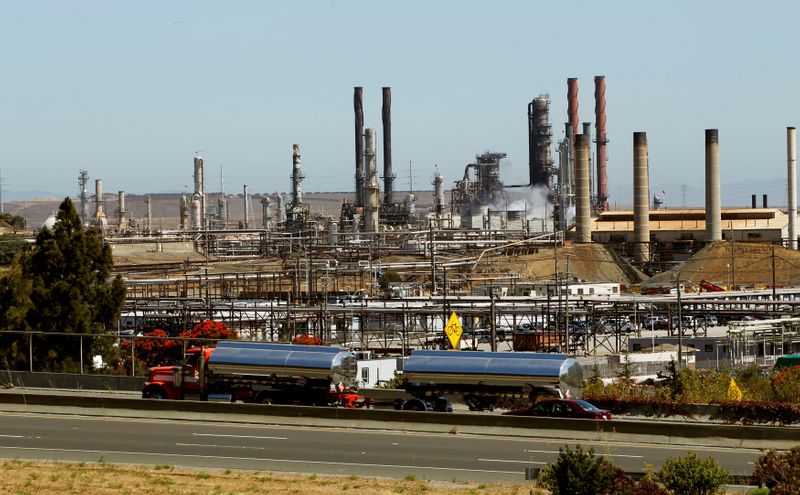By Laura Sanicola
(Reuters) -California air quality regulators vote July 21 on a plan that would require two San Francisco-area refineries to install technology to curb pollution that exacerbates health problems, an official said on Tuesday.
Exposure to soot and fine particulate matter has been linked to health issues ranging from asthma to heart attacks. Recent studies have shown fine particulate matter has a disproportionate impact on communities of color and low-income neighborhoods that are often found near industrial plants.
The two refineries are urging the Bay Area Air Quality Management District (BAAQMD) to adopt a less stringent standard that would not require them to install wet gas scrubbers, which would cost hundreds of millions of dollars. Dozens of refineries have already invested in the technology, including the nearby Valero Benicia refinery.
One refining company, PBF, warned that the cost would likely cause it to shut its facility.
The Bay Area is falling short of state and national air quality standards for particulate matter, requiring the region to further reduce emissions. The refineries in the Bay Area, including the 245,000 barrel-per-day (bpd) Chevron (NYSE:CVX) Richmond and the 157,000-bpd PBF Martinez, emitted 800 tons of particulate matter last year, according to the district.
Last week the U.S. Environmental Protection Agency said it would re-examine federal standards for particulate matter to protect public health.
Air particulate matter has been linked to increased risk of cancer as well as heart, lung and nervous system damage. Residents of Richmond, California, have one of the highest asthma rates in the state, according to county data.
A virtual meeting on the issue in early June drew more than 200 participants for more than five hours of testimony. Environmental activists want the more stringent rule, while union members said tougher measures would cause the PBF refinery to shut, resulting in job losses.
BAAQMD estimated that installing wet scrubbers would cost Chevron about $241 million and PBF $255 million. Chevron and PBF say it will cost them $1.5 billion and $800 million, respectively.
Refineries emit particulate matter when they operate their fluid catalytic cracking units (cat crackers) to turn crude oil into gasoline and high-octane products, as well as burn off petroleum coke.
Under the more stringent rule, the refineries would need to limit annual emissions of particulate matter to 0.01 grain per dry standard cubic foot by 2026, in line with standards applied to new sources of pollution. The requirement would lower PBF and Chevron's particulate matter emissions by half or 400 tons per year, BAAQMD estimates.

The district said the refineries could consider cutting labor costs or increasing gas prices for consumers by 2 cents per gallon to offset the cost.
A less stringent amendment would require the refineries to meet a 0.02 gr/dscf standard by 2023, which would require improving and expanding existing controls at a cost of $30 million for Chevron Richmond and $80 million for PBF Martinez.